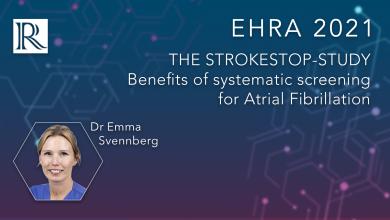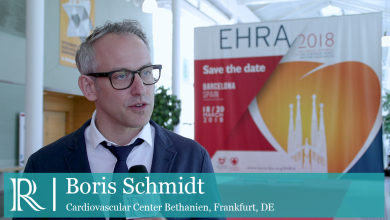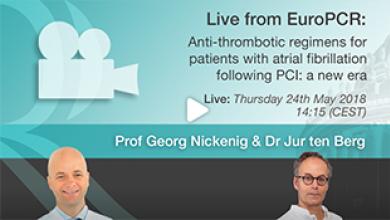Search results
Author(s):
Christian Mahnkopf
,
Younghoon Kwon
,
Nazem Akoum
Added:
2 years ago
Author(s):
Katarzyna Dudzińska-Szczerba
,
Piotr Kułakowski
,
Ilona Michałowska
,
et al
Added:
1 year ago
Author(s):
Emma Svennberg
Added:
2 years ago
Dr Emma Svennberg (Karolinska Institute, Stockholm, SW) summarises the findings from the Systematic ECG Screening for Atrial Fibrillation Among 75-Year-Old Subjects in the Region of Stockholm and Halland, Sweden (STROKESTOP Study). The aim of this study is to determine whether screening for atrial fibrillation by intermittent ECG recording and initiation of anticoagulation treatment among high…
View more
Author(s):
Wern Yew Ding
Added:
2 years ago
Author(s):
George D Katritsis
,
Demosthenes G Katritsis
Added:
3 years ago
Atrial fibrillation (AF) is associated with a fivefold increased risk for stroke, a twofold increased risk for dementia, and a tripling of risk for heart failure,1,2,3 while AF genetic risk is strongly associated with cardioembolic stroke.4In the Framingham Heart Study the percentage of strokes attributable to AF increases steeply from 1.5% at 50–59 years of age to 23.5% at 80−89 years of age.5,6…
View more
Diana Hui Ping Foo
Author
Georgios Tsivgoulis
Author
Author(s):
Boris Schmidt
Added:
6 years ago
This interview with Boris Schmidt from Cardiovascular Center Bethanien, Frankfurt, DE discussesthe AMULET Registry tracking the Amulet™ device in non-valvular atrial fibrillation (NVAF) subjects.
Filmed by Radcliffe Cardiology on-site at EHRA 2017.
View more
Author(s):
Sunil Kapur
,
Moussa Mansour
Added:
3 years ago
Atrial fibrillation (AF) is the most common cardiac arrhythmia, affecting more than three million Americans.1 The management of AF revolves around the alleviation of symptoms related to an accelerated and irregular ventricular response, and the prevention of cardioembolism, notably stroke. In patients with AF, there is a fivefold increased incidence of embolic stroke.2 The prevention of systemic…
View more
Author(s):
Georg Nickenig
,
Jur ten Berg
Added:
5 years ago


















